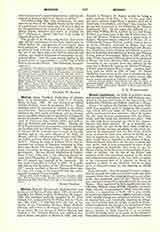

Morton, JOHN, Cardinal, Archbishop of Canterbury, b. in Dorsetshire about 1420; d. at Knowle, Kent, September 15, 1500. He was educated at Oxford (Balliol College) where he graduated D.C.L. Being ordained priest he practiced in London as an ecclesiastical lawyer. The patronage of Cardinal Bourchier obtained for him much preferment and he became privy councillor, Chancellor of the Duchy of Cornwall, master in Chancery, subdean of Lincoln (1450), principal of Peckwater Inn, Oxford (1453), and prebendary of Salisbury and Lincoln (1458). During the Civil War he joined the Lancastrians, was attainted by the Yorkists and lost all his offices. During the reign of Edward IV his attainder was reversed on his sub-mission, and he was made Master of the Rolls (March 16, 1472-3), Archdeacon of Winchester and Chester (1474), and was elected Bishop of Ely on January 31, 1478-9. During the reign of Richard III he was imprisoned but escaped to Flanders, returning to England when Henry VII became king in 1485. He was much trusted by the king and was all-powerful in the government. He was elected Archbishop of Canterbury, October 8, 1486, and in the following March became Lord Chancellor of England. In 1493 Alexander VI created him Cardinal of St. Anastasia. He was made Chancellor of Oxford in 1495. It is probable that he was the author of the “History of Richard III”, usually ascribed to Blessed Thomas More, who as a boy was a page in his household and who subsequently translated it into English.
EDWIN BURTON

